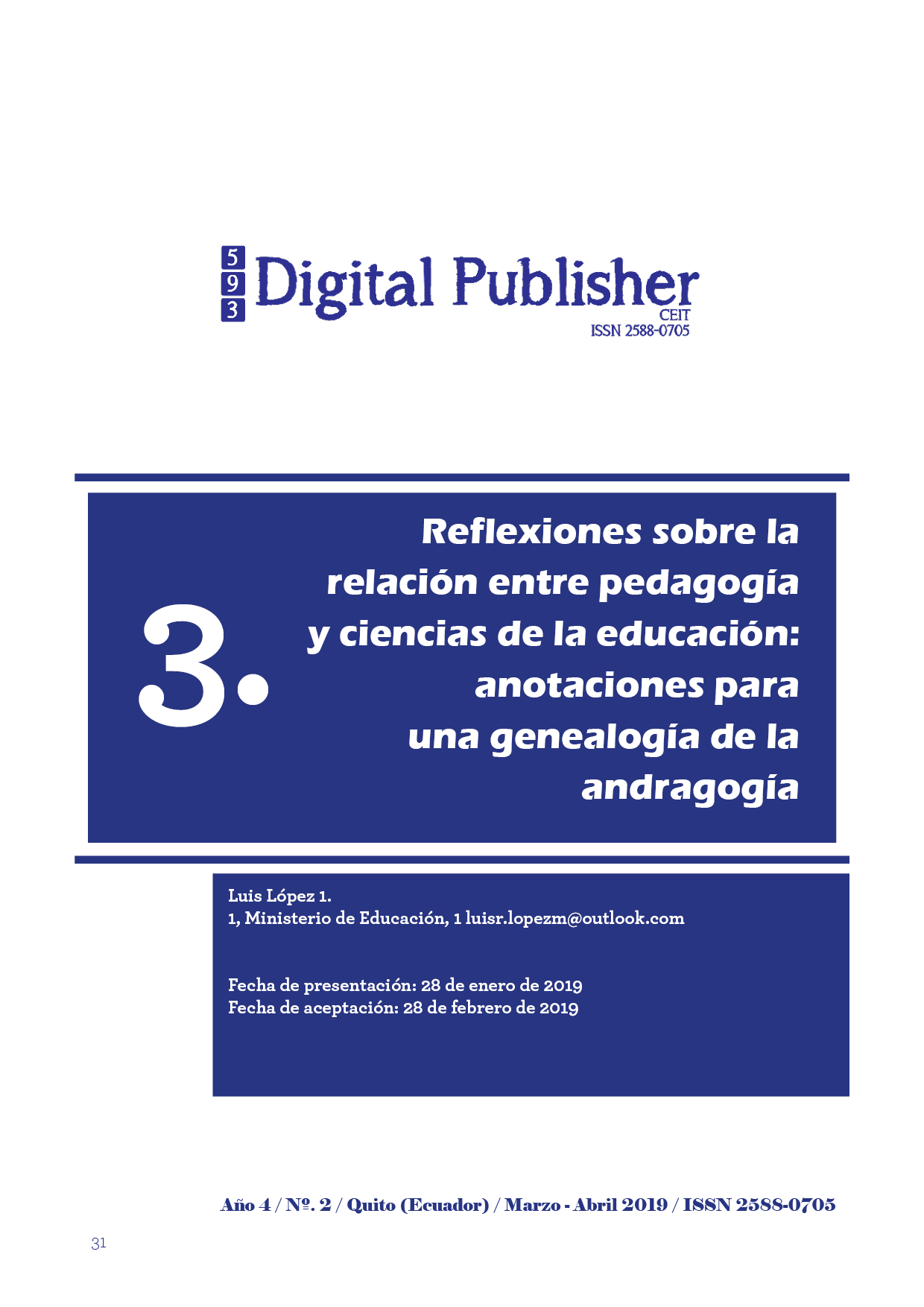Reflections about pedagogy and education sciences: Notes for a genealogy of andragogy
Main Article Content
Abstract
From a genealogy approach, the present research intends to analyze the emergence of different educational disciplines until the actuality. I will focus in the pedagogy, the sciences of education and the denominated Andragogy. In order to understand of the different conditions of possibility that enabled their appearance within a specific historical and conceptual framework I have researched about these disciplines. Consequently, I present how begins of pedagogy is sustained the German idealist tradition while the science of education is enrolled into framework of positivist epistemology and the beginnings of sociology. Similarly, I analyze the emergence of an education aimed the adult, and the apparition of andragogy as another discipline which will look forward to becoming the science that legitimizes this type education. Nevertheless, the andragogy will have numerous difficulties for its consolidation due to the fragility of its epistemological status.
Downloads
Article Details
1. Derechos de autor
Las obras que se publican en 593 Digital Publisher CEIT están sujetas a los siguientes términos:
1.1. 593 Digital Publisher CEIT, conserva los derechos patrimoniales (copyright) de las obras publicadas, favorece y permite la reutilización de las mismas bajo la licencia Licencia Creative Commons 4.0 de Reconocimiento-NoComercial-CompartirIgual 4.0, por lo cual se pueden copiar, usar, difundir, transmitir y exponer públicamente, siempre que:
1.1.a. Se cite la autoría y fuente original de su publicación (revista, editorial, URL).
1.1.b. No se usen para fines comerciales u onerosos.
1.1.c. Se mencione la existencia y especificaciones de esta licencia de uso.
References
Adam, Félix. Andragogía. Ciencia de la Educación de Adultos. . Caracas: Universidad Nacional Experimental Simón Rodríguez, 1977.
Bourdieu , Pierre , y Jean-Claude Passeron. Los herederos. Los estudiantes y la cultura. Argentina: siglo veintiuno editores, 2009.
Brockett, Ralph, y Roger Hiemstra. El aprendizaje autodirigido en la educación de adultos. Barcelona : Paidós, 1993.
Chalmers, Alan. ¿Qué es esa cosa llamada ciencia? México: Siglo veintiuno editores, 1990.
Ernesto, Yturralde. Antropogogía. 08 de 01 de 2019. http://antropogogia.com/ (último acceso: 08 de 1 de 2019).
Follari, Roberto. Psicoanálisis y sociedad: crítica del dispositivo pedagógico. Argentina: Lugar editorial, 1997.
Foucault, Michel. Microfísica del poder. Madrid : La Piqueta, 1979.
Gómez, Ricardo. La dimensión valorativa de las ciencias . Buenos Aires: Universidad Nacional de Quilmes , 2014.
Göttler, Josef. Pedagogía sistemática. Barcelona: Herder, 1955.
Herbart, Johann. Pedagogía general derivada del fin de la educación . Madrid: Humanitas, 1806.
Jisbelisky, Andrea. Ciencias Agógicas. 03 de 10 de 2016. http://andreahernandezwilches.blogspot.com/2016/10/ciencias-agogicas.html (último acceso: 08 de 2019 de 01).
Kuhn, Thomas. La estructura de las revoluciones científicas . Argentina: Fonde de cultura económica , 1962.
Marshall, James. «Foucault y la investigación educativa .» En Foucault y la educación , de Stephen Ball, 15-32. Madrid : Paideia , 1990.
Morin, Edgar. Introducción al pensamiento complejo. Barcelona: Gedisa, 2009.
Prats, Enric. El sentido de la teoría de la Educación . España: Universidad oberta de Catalunya, 2010.
Ubaldo, Samuel. Modelo Andragógico. Fundamentos . México: Universidad del valle de México , 2009.
Unesco. Confintea VI. Marco de acción de Belém. Brasil: Uil, 2010.
Varela , Julia, y Fernando Alvarez. La arqueología de la escuela. Madrid: La Piqueta, 1991.
Vázquez, Stella. La filosofía de la educación . Buenos Aires: CIAFIC ediciones, 2012.
Zubiría, Julián De. Los modelos pedagógicos. Hacia una pedagogía dialogante. Bogotá: Magisterio, 2010.

